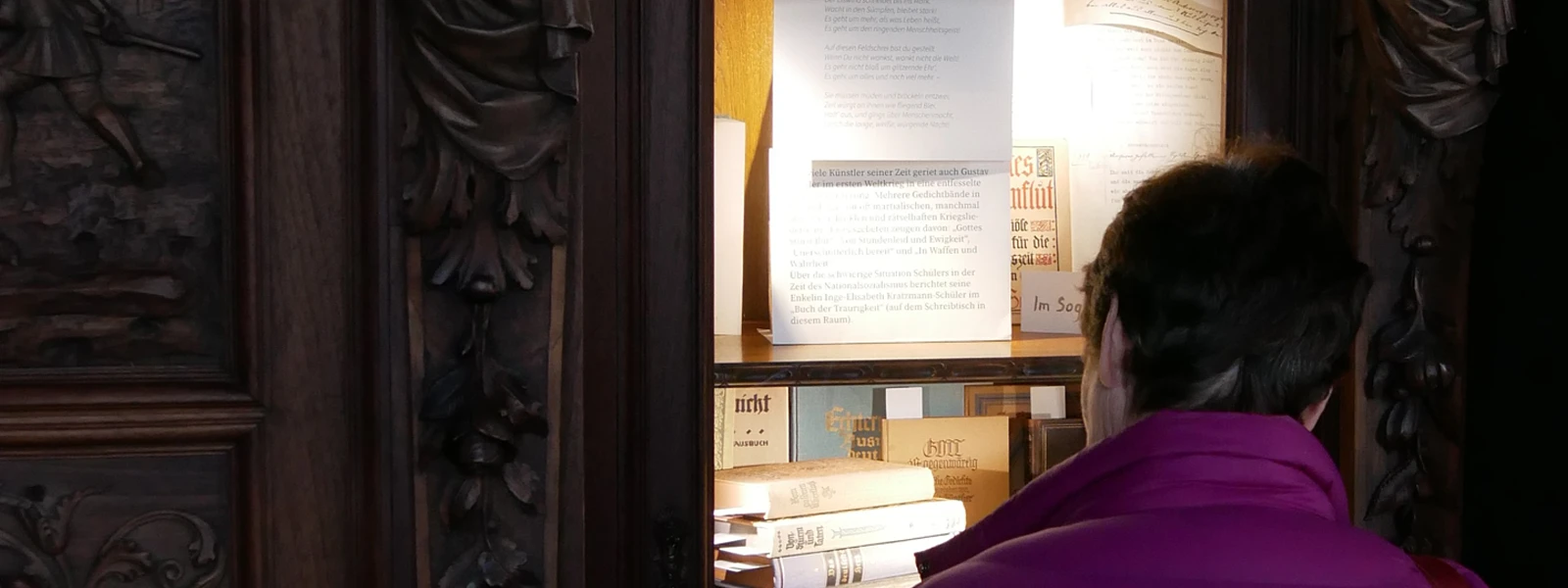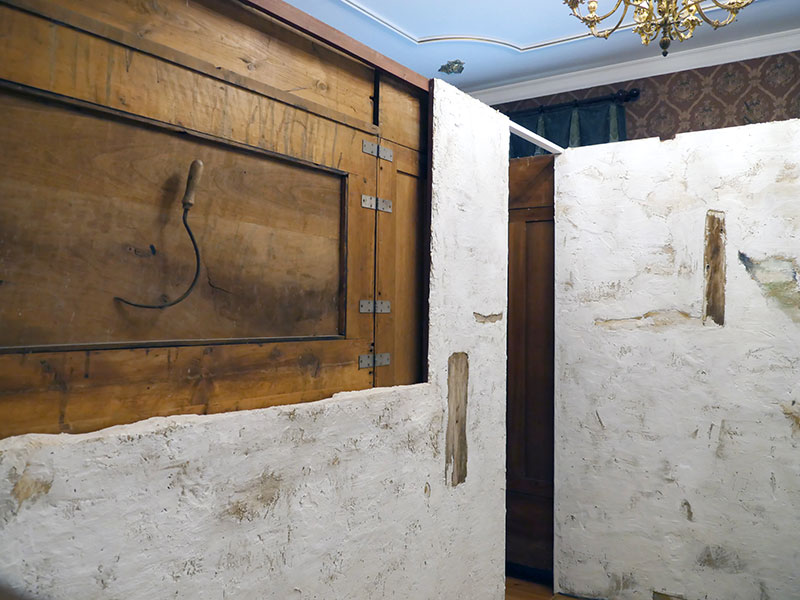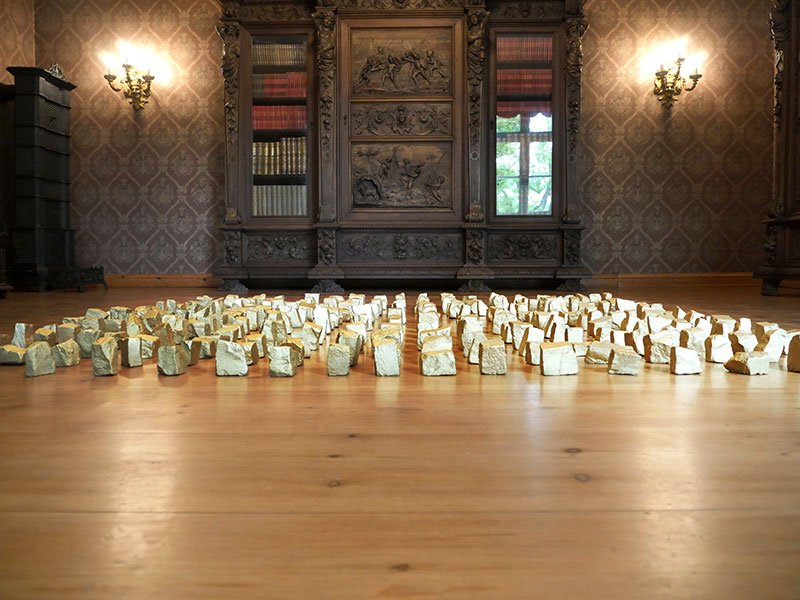
Gustav Schüler Archive, Book of Sadness and Film Station
Gustav Schüler Archive
Gustav Schüler was a well-known poet in the first third of the twentieth century. There was hardly a poetry anthology in which he was not represented with his poems between Goethe, Rilke or Morgenstern. His song texts could be found in church hymnals and he corresponded with Hermann Hesse and Detlef von Lilienchron. Born in 1868 into a small farming family in Königlich Reetz, he made a living as a freelance writer with his talent and love of language. He died in Bad Freienwalde in 1938 after an eventful and not always easy life and work.
As a result of a communication between Schüler's descendants and the Oderbruchmuseum initiated by Erika Kröber from Neureetz, the family handed over the poet's entire estate to the Oderbruchmuseum in 2023.
As a result, the so-called Herrenzimmer with the Wilhelminian-style living interiors from the Charlotte von Mahlsdorf collection has now been redesigned as the Gustav Schüler Archive. It also provides insights into the poet's life and work in the form of an exhibition. The recordings of a poetry project by class 9b of the Bertolt Brecht Grammar School, developed in 2023 under the direction of Gabriele Voß and recorded at the Wriezen Music School by Steven Kopp, are presented at an audio station.
Book of sadness
The Book of Sadness on the desk collects and comments on photographs and documents from the Nazi era in the Oderbruch. If you can contribute to this, we look forward to your help!
Movie station
In the back niche of the room, we present the work of the Oderbruch Museum in film and video with short documentaries, productions from our landscape education and insights into the museum's theater work.
Room Archive
2018-2023: Films and archive materials
After Kerstin Baudis' intervention, the room with its Wilhelminian-style interior was converted so that it could also serve as a TV room. The films shown present the work of the museum on stage and in front of the camera (theater plays, event documentaries, farmer films, videos from rural education).
The "Book of Sadness", an annotated collection of documents and photos from the Nazi era in the Oderbruch, was placed on the desk.



2018 Zwischenraum - A Space Installation by Kerstin Baudis
Inside and outside, house and landscape, poor and rich - everything is connected.
For the annual theme of agriculture 2018, artist Kerstin Baudis explored the question of how land use in and around Altranft has changed the cultural landscape and the way people live together over time. She talked to people in the village, explored the landscape, did research. As a result, she used the existing furniture in the stately rooms of the castle to build walk-in interstitial spaces that reveal the loss and gain of cultural landscape dynamics.
In four interventions in the castle, she addressed the various facets of manorial agriculture - from the production of wealth to poverty, flight and the present - and found opportunities for creative counterparts in the fisherman's house. Just as it was visible in the manor house that wealth was sweated out through farm labor, it was now possible to see in the farm worker's house how the silverware escaped through the black kitchen's chimney and what labor time went into a bushel of grain. Kerstin Baudis' work, however, was not primarily about social injustice; above all, it established the connection between the different parts of the museum. The outside was reflected in the inside, the inside was turned inside out. This created the perception of an in-between space.
Kerstin Baudis' work was very valuable for the development of the museum. Not only did she enrich the annual theme with many interesting room installations, she also gave the museum an impulse for further courageous handling of the rooms that had been created during the time of the open-air museum. Respecting their character, but nevertheless introducing one's own questions and uses, has since succeeded in many places.

2017 The guest rooms. Room installation by Ellen Kobe
Artistic interventions with works by Beate Bendel, Ingo Biermann, Ellen Kobe, Achim Kühn, Coco Kühn, Petra Lottje, Tanja Ostojic, Fiene Scharp, Judith Siegmund, Elisabeth Sonneck and Astrid Weichelt.
From May 20 to December 2, 2017, Berlin artist Ellen Kobe presented "DIE GÄSTEZIMMER" at the Oderbruch Museum Altranft. She used the bed and chair, window and curtain, floor and table of the Wilhelminian furniture from the Charlotte von Mahlsdorf collection to lay traces that lead into the past and present of the Oderbruch. The wealth of the Altranft estate, which has melted away time and again, played a role, as did the experiences of the Altranft residents from the GDR era, when the castle was a cultural center. The experiences of the 1947 floods are reflected upon, as is the changing significance of women in the context of the manor's practice.
The vernissage of the exhibition project took place on May 20, 2017 in the form of Ellen Kobe's performance "Die Schimmelreiterin" with the participation of actor Thomas Bading.